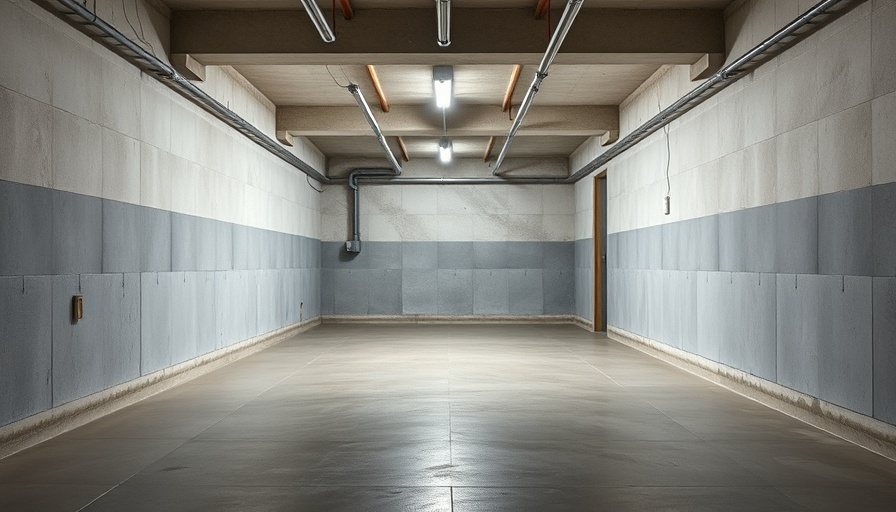
Understanding the Dangers of Mold in Portland's Homes
Mold can quickly transform your dream home into a nightmare. In Portland’s damp climate, the presence of mold is not just an aesthetic annoyance; it poses a serious health risk. Mold thrives in areas with high humidity and moisture, making homes in this region particularly vulnerable. Recognizing this silent intruder is essential for every Portland homeowner or renter seeking to protect their family and property.
Mold spores are omnipresent; thus, when provided with moisture and food sources, they proliferate with alarming speed. Among the various types found in homes, Stachybotrys chartarum, commonly known as black mold, stands out as particularly concerning due to its potential to cause severe respiratory issues. However, this is just one of many common household molds including Cladosporium and Penicillium, each presenting unique challenges for homeowners.
The Impact of Mold Exposure on Health
The health implications of mold exposure cannot be overlooked. Mold's spores and mycotoxins can trigger a host of reactions, from mild allergic responses to serious respiratory ailments. Children, older adults, and individuals with pre-existing health issues are especially at risk. In fact, ongoing exposure can exacerbate conditions like asthma and lead to chronic respiratory problems. According to recent studies, living in damp, mold-infested homes increases asthma risks in children by up to fifty percent. Understanding these risks is vital as it emphasizes the urgency of addressing mold issues as soon as they arise.
Why DIY Solutions Often Fail
Many homeowners may feel inclined to tackle mold problems on their own, often using DIY methods. Unfortunately, these attempts can exacerbate the mold situation instead of resolving it. Simply cleaning mold with household products can release spores into the air, which may then settle elsewhere in the home, creating new outbreaks. According to experts from ServiceMaster of Portland, professional remediation is crucial for effective mold elimination. Professionals utilize advanced techniques and equipment, such as HEPA filters and air scrubbers, to not only remove the mold but also to capture and neutralize spores in the air.
Choosing the Right Mold Remediation Service
When selecting a mold remediation service in Portland, a few factors must be at the forefront. Start by researching local companies and reading customer reviews to gauge their reputation. A leading service will have a proven history of successfully handling mold infestations. Look for services that offer comprehensive assessments, including air quality testing and detailed plans for remediation. Make sure the company adheres to industry standards set by organizations like the Institute of Inspection, Cleaning and Restoration Certification (IICRC).
Accreditation from these organizations not only indicates a company's professionalism but also emphasizes their commitment to safe and effective practices. Always inquire about their approach to remediation, which should encompass identifying and eliminating the root causes of mold growth—not just the surface solutions that might lead to recurrence.
Actionable Steps for Prevention
Preventative measures are the best defense against mold growth in Portland's particularly moist climate. Maintaining optimal indoor humidity levels between 30% and 50% can significantly reduce mold risk. Simple actions include using dehumidifiers, ensuring proper ventilation in bathrooms and kitchens, and regularly checking for leaks and water damage.
Routinely inspecting areas prone to moisture, like basements and attics, can catch potential issues before they escalate. Consider implementing an annual maintenance schedule to check for signs of mold growth or moisture. As local experts recommend, if you spot any water stains or smell a musty odor—common indicators of mold—you should act swiftly to mitigate its spread.
The Remediation Process Explained
Understanding the mold remediation process is critical for homeowners. Effective remediation involves several steps:
- Inspection: Professionals will thoroughly inspect the property to identify mold types and sources.
- Containment: The affected area is sealed off to prevent spores from spreading during the cleanup.
- Removal: Contaminated materials should be carefully disposed of and cleaned to eliminate residues.
- Post-Remediation Testing: Air quality testing ensures no remaining spores pose a risk.
By following these steps, professionals work to not only eliminate the existing mold but also to prevent future infestations.
Conclusion: Take Action Now to Protect Your Home
Being proactive about mold prevention and timely remediation can protect your home and health. In a city like Portland, where mold flourishes in our rainy climate, staying informed and vigilant is essential. If you suspect mold in your home, don’t hesitate—contact a professional remediation service, and breathe easier knowing you’ve taken the right steps toward a healthy environment.
 Add Row
Add Row  Add
Add 




 Add Row
Add Row  Add
Add 

Write A Comment